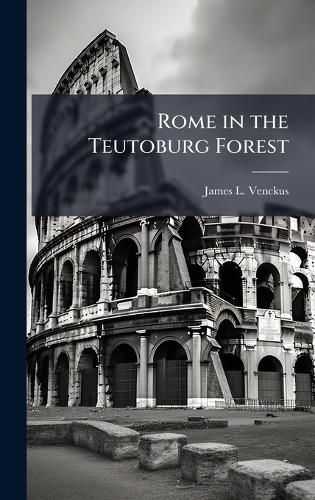Readings Newsletter
Become a Readings Member to make your shopping experience even easier.
Sign in or sign up for free!
You’re not far away from qualifying for FREE standard shipping within Australia
You’ve qualified for FREE standard shipping within Australia
The cart is loading…






This title is printed to order. This book may have been self-published. If so, we cannot guarantee the quality of the content. In the main most books will have gone through the editing process however some may not. We therefore suggest that you be aware of this before ordering this book. If in doubt check either the author or publisher’s details as we are unable to accept any returns unless they are faulty. Please contact us if you have any questions.
This paper examines the battle of Teutoburg (9 A.D.), its consequences on the Roman world, and the role cultural misunderstanding played on the tactical, operational, and strategic levels. The Roman commander's cultural misunderstanding of his enemy caused mistakes at the operational and tactical levels, while the Roman Emperor's cultural misunderstanding brought about mistakes at the strategic level and created poor policy decisions following the battle, which affected Rome like no other battle in its history. Chapter 2 examines the consequences of other Roman loses (with much higher casualties) to show how none of them carried the same impact as the Teutoburg loss. They were but temporary "setbacks", while Teutoburg was Rome's first military "defeat" in its history. The Roman direction of conquest into Germania and the image of the pre-Teutoburg Germanic barbarian (an image which changes greatly into an elevated status following the massacre) are also examined. Chapter 3 examines the commanders of both sides and the battle itself. Chapter 4 looks at the significance of this loss. This battle caused Rome to adopt its first permanent defensive boundary and set the first limit of the Roman Empire.
This work has been selected by scholars as being culturally important, and is part of the knowledge base of civilization as we know it. This work was reproduced from the original artifact, and remains as true to the original work as possible. Therefore, you will see the original copyright references, library stamps (as most of these works have been housed in our most important libraries around the world), and other notations in the work.
This work is in the public domain in the United States of America, and possibly other nations. Within the United States, you may freely copy and distribute this work, as no entity (individual or corporate) has a copyright on the body of the work.
As a reproduction of a historical artifact, this work may contain missing or blurred pages, poor pictures, errant marks, etc. Scholars believe, and we concur, that this work is important enough to be preserved, reproduced, and made generally available to the public. We appreciate your support of the preservation process, and thank you for being an important part of keeping this knowledge alive and relevant.
$9.00 standard shipping within Australia
FREE standard shipping within Australia for orders over $100.00
Express & International shipping calculated at checkout
This title is printed to order. This book may have been self-published. If so, we cannot guarantee the quality of the content. In the main most books will have gone through the editing process however some may not. We therefore suggest that you be aware of this before ordering this book. If in doubt check either the author or publisher’s details as we are unable to accept any returns unless they are faulty. Please contact us if you have any questions.
This paper examines the battle of Teutoburg (9 A.D.), its consequences on the Roman world, and the role cultural misunderstanding played on the tactical, operational, and strategic levels. The Roman commander's cultural misunderstanding of his enemy caused mistakes at the operational and tactical levels, while the Roman Emperor's cultural misunderstanding brought about mistakes at the strategic level and created poor policy decisions following the battle, which affected Rome like no other battle in its history. Chapter 2 examines the consequences of other Roman loses (with much higher casualties) to show how none of them carried the same impact as the Teutoburg loss. They were but temporary "setbacks", while Teutoburg was Rome's first military "defeat" in its history. The Roman direction of conquest into Germania and the image of the pre-Teutoburg Germanic barbarian (an image which changes greatly into an elevated status following the massacre) are also examined. Chapter 3 examines the commanders of both sides and the battle itself. Chapter 4 looks at the significance of this loss. This battle caused Rome to adopt its first permanent defensive boundary and set the first limit of the Roman Empire.
This work has been selected by scholars as being culturally important, and is part of the knowledge base of civilization as we know it. This work was reproduced from the original artifact, and remains as true to the original work as possible. Therefore, you will see the original copyright references, library stamps (as most of these works have been housed in our most important libraries around the world), and other notations in the work.
This work is in the public domain in the United States of America, and possibly other nations. Within the United States, you may freely copy and distribute this work, as no entity (individual or corporate) has a copyright on the body of the work.
As a reproduction of a historical artifact, this work may contain missing or blurred pages, poor pictures, errant marks, etc. Scholars believe, and we concur, that this work is important enough to be preserved, reproduced, and made generally available to the public. We appreciate your support of the preservation process, and thank you for being an important part of keeping this knowledge alive and relevant.